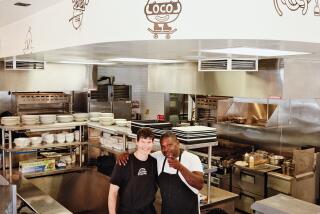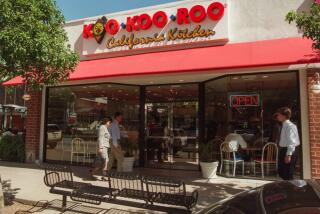Bigger Menu, Revived Ads : Old Hand Guides Love’s Chain Onto Comeback Trail
Love’s labors apparently haven’t been lost.
After an 18-month campaign to cut unprofitable operations, the money-losing Brea-based Love’s Barbecue Restaurants chain finally expects to break even.
And with the help of new ownership, some trendy new menu items and the return of its popular “When you’re in Love’s, the whole world’s delicious” ad campaign, the 22-outlet company hopes to post a modest profit at the end of its fiscal year in June.
The turnaround follows seven years of losses. And industry observers give most of the credit to the return of Ronald C. Mesker, who served as Love’s president and chief executive from 1973 until 1979.
The 50-year-old executive was brought back 16 months ago, a month after federal regulators seized its owner, Butterfield Savings & Loan Assn., which had purchased the restaurant chain in 1983. Santa Ana-based Butterfield was declared insolvent and taken over by federal regulators in August, 1985.
Brought Bargain Price
The S&L;’s new management sold the barbecue chain on Dec. 17 for a bargain price of $1.2 million to BSB Foods Inc., a private investor group.
The sale last month gave Mesker an important ally in BSB’s chairman, Harry Shuster, who reportedly is the company’s major shareholder.
Shuster also is president of Lion Country Safari, which has been transformed from a money-losing wild animal park to a water-oriented recreational attraction.
The projected changes at Love’s are far less extensive than a major overhaul.
By late February, the chain plans to expand its menu by adding Cajun chicken and steak, catfish “fingers” (strips of catfish fillet) and “California two-step” barbecue items--a smoked and spicy style without the slight sweetness in Love’s original recipe. It also will add two salads to appeal to calorie- and health-conscious diners.
Drive-Ins Considered
In addition, Love’s will be looking into whether to add drive-through stores that emphasize fast, take-out service, to appeal to busy customers.
Along with the menu changes will come price hikes averaging 2% to 5%.
Mesker predicts that the company’s annual sales will hit $24.2 million by the end of 1987, an average of $1.1 million per store and a 10% increase from the current yearly average sales per outlet of $1 million.
“We’ve now had four successive months of profitability,” said Mesker, who believes the chain will increase sales by 6% to 10% and customer traffic by 5% during the year.
Industry observers aren’t quite so optimistic. While adding Cajun-style cuisine makes sense to create new product niches, Love’s competitors “are doing a lot of the same thing,” said Paul W. Salazar, a restaurant industry analyst with Crowell Weedon & Co. in Los Angeles.
The company’s plans “might not introduce growth so much as stay even with everybody else,” Salazar said.
If Love’s strategies do indeed work, it won’t be the first time that the company has rebounded. The chain was a division of the International House of Pancakes when Mesker first joined 13 years ago. During his five-year tenure in the 1970s, its business boomed--in part, because of an advertising campaign that introduced the slogan, “When you’re in Love’s, the whole world’s delicious.”
The chain in those years averaged annual sales volume increases of 18%, Mesker said. In 1979, IHOP saw profits of $2.7 million from the barbecue chain. But that was followed by three straight years of losses.
In the three years that Love’s was owned by Butterfield, the chain’s net operating losses totaled $8.6 million and annual sales per outlet had plunged as low as $550,000 in some stores by mid-1985.
Mesker today blames Love’s fiscal problems on “poor management” by Butterfield S&L; from 1983 until it was taken over by the federal regulators who recruited him to return the chain to profitability.
The first problem confronting Mesker was a dispute with more than half of the Love’s franchise operators (only one Love’s restaurant is company-run). That brouhaha was settled in April, 1986, when the franchisees paid the chain $200,000 plus royalties and a percentage of sales. Love’s, in turn, waived some royalty payments and promised to help develop new menus and start a new promotional campaign.
The new ad campaign kicked off in April with a return to the “When you’re in Love’s” slogan.
More to Read
Eat your way across L.A.
Get our weekly Tasting Notes newsletter for reviews, news and more.
You may occasionally receive promotional content from the Los Angeles Times.








